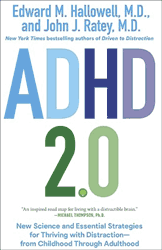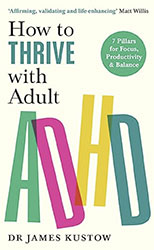When ADHD co-occurs with an eating disorder
ADHD is commonly diagnosed, and there's a big overlap with eating disorders. Yet it's quite hard to find clinicians with expertise in both ADHD and eating disorders. Often, treatment-as-usual is given — for children and teens that's a family-based approach like FBT. But how should it be individualised for your child with ADHD?
On this page I am copying for you some tips a mother shared with me (names changed for privacy).
From here on, these are her words.
Diagnosing ADHD, when your child has an eating disorder
Our treatment team (CAMHS) suggested a diagnosis of ADHD after a few months of knowing Rosa and addressing her anorexia. One of their observations was hyper-talkativeness. I wasn't convinced, partly due to my lack of understanding of ADHD in girls, but also because I saw that Rosa was purposefully talking about everything and anything to avoid the 'difficult topics' relating to the eating disorder.
We got a private assessment: they did diagnose ADHD and they suggested a non stimulant medication. At first we resisted: I had read that medication is given to youngsters who struggle to function in school, and Rosa did not seem to have an issue with that (certainly pre-anorexia).
However, we got to a really difficult stage when Rosa's habits/behaviours were more disordered than ever before, she had a huge compulsion to move and to exercise, and her mood was particularly low. This, even though her weight now appeared to be back to normal.
The compulsion to move: ADHD plus anorexia
Rosa had a manic, relentless need to move, to tense her muscles. She wouldn't sit back in a chair. She'd tighten up, brace, do sit-ups. Sometimes we could interrupt those crunch exercises by offering a reward.
One day Rosa asked us, “Why are you allowing me to do these movements under the duvet?” We guessed that she was saying, “I need you to stop me from doing this.” And still we couldn't stop it and with all the issues going on simultaneously, we didn't know how to pick our battles.

Medication for ADHD
Given all the difficulties, we decided to trial the non-stimulant, Guanfacine. Things improved after that.
Without doubt the medication has reduced the drive in Rosa to move, and allowed her to begin a journey of resting more once again.
Other changes we made
Our daughter has made major improvements and we can think of a number of factors, apart from the medication:
- We reduced the individual psychotherapy provided by CAMHS as it lacked specialisation
- We got regular ADHD treatment from the private clinician who had done the diagnosis and prescribed the medication.
- We moved from CAMHS to a private FBT specialist. With her years of experience and her understanding of the impact of ADHD on the eating disorder, she was a lifeline.
- Rosa magically got a few better friends!
She needed more weight
I had watched your video 'Growth charts and goal weight made simple' very early on in the process. But I didn't feel empowered enough to take it forward when we first started at CAMHS. They were not looking at her growth history, and their goal weight was a general one of "100% weight-for-height", on the low side for Rosa.
While she mostly complied with meals, Rosa's eating-disorder and ADHD behaviours continued to be high. In fact they got worse around 98% weight-for-height. CAMHS were reducing our sessions, wanting to give her more autonomy. They allowed the school meals to go unsupervised, even when Rosa revealed she'd been cheating.
We moved to a private FBT therapist, who — among other things — encouraged us to keep taking Rosa's weight higher to get correct, full weight recovery.
Things have definitely eased since Rosa has returned to what I now believe is her true weight. Healing began and there was definitely less ED resistance.
A drive still remains in Rosa to engage in ADHD and eating-disorder behaviours. We are daily repeating, reinforcing and repeating again to break all the habits. One goes and another appears. We add it to the list to be worked on, and that's our story to date.
[Update 5 months later: Rosa remains in a good stage of recovery].
Types of medication
Here's the small amount I know about medication….
In the 'stimulant' family: Ritalin
The first line of medications for ADHD is in the stimulant family – Ritalin and Aderall are examples — Methylphenidate and Dexamfetamine. These work by increasing certain neurotransmitters in the brain: dopamine and serotonin, for instance, play important roles in how we think, pay attention and stay motivated.
However, a very common side effect is appetite suppression. That makes it not appropriate for someone recovering from an eating disorder.
The alternative medications are 'non-stimulant' drugs
There are two categories of non-stimulant medicines — Guanfacine and Atomoxetine are examples.
First, Noradrenaline reuptake inhibitors (NRI), such as Atomoxetine. It blocks the noradrenaline transporter, which increases noradrenaline levels in the prefrontal cortex. It also indirectly increases dopamine availability there too. This increases the ability to pay attention, and decreases hyperactivity and impulsiveness.
The other category is alpha agonists, to which Guanfacine belongs. It's thought to affect receptors in the brain that lead to strengthening working memory, improving attention and impulse control. If it works you should seem a calming effect and improved focus.
I'm very much NOT an expert but hope the information is of some use.

Reflecting on triggers
ADHD tends to manifest in girls around the age of 12, and it dawned on me that this corresponds to a period of big challenges, with major hormonal and development changes. I wonder if this could be an important factor for some girls who develop eating disorders: their previous coping mechanisms seem to not quite be enough!
Note also that Rosa had had a growth spurt as well as a desire to 'eat healthy', around the time the eating disorder began.
End of this mother's account and back to Eva
I hope this account helps you with your research and gives you the confidence to ask for more expertise from treatment providers.
I have a comment to share from another parent (and please scroll down for more comments):
"My 22-year old was on 3 tablets per day of Medikinet (Aderall), no doubt with appetite suppressant effect. The eating-disorder service psychiatrist said that's a high dose. They reduced the immediate-release 3 tablets per day to the equivalent of 1 tablet per day of the slow/extended-release format."
I'm sure there's a lot more to know, and I'll be very happy if you have more useful experience to share in the comments.
This may help you in your research: The AED Guidebook for Nutrition Treatment of eating disorders and The AED Guide to Selecting Pharmacologic Treatments for patients with eating disorders.
There's also a guide for professionals: Supporting nutrition in those with attention deficit hyperactivity disorder (ADHD) Among the authors, I recognise some of the names — dieticians who have been helpful to families I support, and who've written other great guides: Clare Ellison, Ursula Philpot, Paola Falcoski, Donna Manson, Patricia Thomas-Owolabi and Hannah Hickinbotham (Lived Experience).
For what it's worth, I found this book informative: ADHD 2.0: New Science and Essential Strategies for Thriving with Distraction–from Childhood through Adulthood by Hallowell and Ratey.
There's also 'How to thrive with adult ADHD' by James Kustow: I mention it as I saw him in a webinar, where clearly he understood well the overlap with eating disorders — so might be a resource for you.
Peace Pathway for eating disorders and autism produces resources that include ADHD as well as autims ('AuDHD'): see in particular their 18-page carer's guide Caring in Context a neurodiversity-informed guide to supporting someone with an eating disorder.
For those of you in the UK, you may find waiting lists for diagnosis are huge. I hope that because your child is in the careof eating disorder services, you will get the ADHD care you need. Be aware that the NHS gives you the choice to go to a neighboring service that might better serve you (more here).
Note that many youngsters with ADHD are autistic, and many autistic kids have ADHD. Eating disorder clinicians have been keen to learn, in recent years, how to address the intersection of autism and eating disorders.
These posts may help you with more of your questions:
- Exercise compulsion with an eating disorder — what can we learn from others?
- Autism and eating disorders: individualising treatment for your autistic child or teen
- When OCD shows up alongside your child’s eating disorder
- How to calm your child when the eating disorder heightens anxiety and panic
- How do you get your child to eat?




LEAVE A COMMENT (parents, use a nickname)